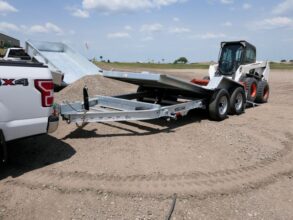Fueling Propane’s Potential
By Jeremy Wishart
The advantages of running propane-powered landscape equipment make converting an easy decision. Propane is affordable, clean, and American-made, and there are dozens of equipment options from mowers to generators to pickup trucks available. After a contractor makes the initial decision to transition a fleet, the next step is choosing a refueling method. Based on the size and needs of an operation, a propane retailer will provide the proper training, setup, and support a contractor needs to smoothly run a propane-powered fleet.
Myth busting
Because the propane refueling process is unfamiliar, there are a few common misconceptions about using the fuel. But with any change or transition, a little time and training go a long way in easing the upfront anxiety of learning a new process.
A common misconception landscapers express about refueling with propane is that it’s difficult and time-consuming. The opposite is actually true. After some basic education and training from a propane retailer, contractors will find refueling with propane to be just as easy as, or easier than, refueling with gasoline or diesel — and more efficient because they’re no longer making daily trips to the gas station.
Another misunderstanding landscapers have is that they are responsible for going to the propane retailer’s location to get their fuel. “Contractors always worry about how they’re going to get their propane if they convert. They think they have to get it from somewhere,” said Mark Linkletter, mower fuel sales manager for Ferrellgas, a nationwide propane retailer headquartered in Overland Park, Kan. “Our business is predicated on delivering propane, so we make it as hassle-free as possible for landscapers. Our job is to deliver propane to them so they can spend more time mowing, and less time refueling every day.”
Converting to propane also ensures contractors are using high-quality fuel that won’t harm small engines. “Many landscapers are using 87 octane fuel with an ethanol mixture, which is harmful to small engines,” Linkletter points out. “Using propane leads to longer engine life, because it emits significantly lower levels of greenhouse gases and other harmful pollutants. I like to tell people [that] propane is as green as the grass being mowed.”
Propane is also a much safer fuel to handle, and better for the environment. Unlike gasoline or diesel, propane cannot be spilled, eliminating the environmental threat posed by pooling chemicals. And, because it’s a closed fuel system, propane can’t be easily pilfered, reducing the risk of theft.
Doorstep delivery
Propane retailers don’t really drop propane cylinders off at the door, but the ease and convenience of propane delivery programs makes it seem like they do. Landscapers have a couple of propane delivery options available.
The first option for refueling with propane is to participate in an onsite cylinder refill program. A cylinder refill program is exactly what it sounds like. A propane retailer refills empty propane cylinders at a landscaper’s shop a specified number of times per week, depending on the size of their fleet and needs during peak months.
The second option for refueling with propane is a cylinder exchange program. Like the refill program, this method offers the same hassle-free benefits as an onsite refill program. A retailer delivers full propane cylinders to a landscaper’s cylinder cage and switches out empty cylinders for full ones on a regular schedule. With this option, propane retailers will train landscapers and crews on how to properly store empty and full cylinders so the retailer knows which ones to take.
Both of these programs are ideal for contractors who are just getting started with propane or who run a small fleet of five mowers or less. Tom Procter, a plant manager for MFA Oil, said each program and exchange route is customized to fit the landscaper’s needs.
“If they cut frequently, we do it three days per week on Monday, Wednesday, and Friday, so they have enough fuel to run through the weekend,” Procter said. “We make sure they have propane ready at all times.”
Whether a contractor chooses the refill or exchange option depends on a few variables, including customer preference. These delivery methods work really well for smaller fleets of propane-powered equipment, because less propane is needed per week than contractors who may also drive a fleet of propane autogas pickups.
“Ultimately, we want contractors to understand this is a fuel-to-you program,” said Linkletter. “Ferrellgas has more than 600 retail locations across the country and thousands of individual retailers. If we’re not in the area, chances are someone else is, so landscapers are going to be able to get their fuel.”
Luke Fitzpatrick, another MFA Oil plant manager, added that they also consider weather and shifts a contractor runs when determining when to exchange or refill cylinders. “Propane is domestically produced and very portable, so contractors won’t have supplier issues in their area,” he said. “The main thing is working out when the best delivery times are throughout the week, especially during peak season.”
Landscapers can find a propane retailer in a variety of ways, including on [ital>autogasusa.org<ITAL] P
Contractual details
Another convenience of participating in a cylinder exchange or refill program is that retailers provide the cylinders, and ensure they’ve been properly inspected. Landscapers don’t need to furnish their own cylinders or be concerned with legalities of proper cylinder certification or inspection.
“We assist in providing cages and cylinders, so landscapers don’t have to invest any more money than what they’re paying for their new propane equipment,” Linkletter explained. “This allows us to maintain the cages and cylinders so landscapers don’t have to worry about it.”
The cost of the cages, cylinders, delivery, and propane are all wrapped into the contract a landscape contractor enters into with the retailer. Landscapers can either sign a bulk rate contract, keeping their propane-per-gallon price steady throughout the year, or they can pay by the gallon as they purchase or refill cylinders. With this type of contract, contractors must pay the current market price of propane. There are benefits to both types of contracts. Locking in a price makes it easier for landscapers to plan fuel costs for the entire year. Paying by the gallon allows them to take advantage of a down market. Propane retailers will work with landscapers to determine the best method based on their needs.
Propane on demand
Contractors who have grown their propane-powered fleet and require a large volume of propane on demand may fare better with installed onsite fueling infrastructure. This option gives contractors the ability to pump their own propane into empty cylinders or refuel propane-autogas trucks.
Propane retailers determine whether a contractor is ready for onsite infrastructure based on a couple factors: annual usage, and how many “units” a contractor runs.
“I look at a standard 60-inch zero turn mower as one propane unit, and we set the threshold at six units before looking at infrastructure for a contractor,” said Proctor. “That could add up to about 4,000 to 6,000 gallons annually for that propane customer.”
Said Linkletter, “We look at every customer independently and work together to implement a fuel solution. Just like our customers have discovered no two lawns are alike, we’ve discovered there’s not a one-size-fits-all solution when it comes to meeting our customers’ propane needs.”
Onsite infrastructure is an investment for both the propane provider and the landscaper, and is beneficial for both. In exchange for entering into a contract, propane retailers may assist contractors with the upfront costs of installing the infrastructure. Generally, contractors are responsible for the expense of a cement pad and the protective bollards, and possibly the electrical costs. Retailers will then cover the expense of the dispenser.
“Additional costs go into supporting infrastructure for us, so it’s in everyone’s best interest to make sure asset costs are covered,” said Linkletter. “Assets include the tank, pump and motor, all of the piping, and the labor of installing the infrastructure.”
Contractors must also consider some basics before any infrastructure is installed, said Fitzpatrick.
“A couple of things to think about are the amount of space available at the landscaper’s location and any regulatory hurdles,” he said. “Some areas have specific local, state, and federal permits and regulations that may take a month or so to get worked out. Another consideration is the possibility for resale, like if they want to fill autogas vehicles or grilling cylinders.”
Added Linkletter, “Contractors should understand who or what local authority has jurisdiction of the land. If they are on leased property from a landlord, they also need to understand what the landlord requires. Understanding insurance and whether that changes due to infrastructure is another thing to consider.”
Once the regulatory issues are worked out, installing onsite fueling infrastructure is a straightforward process. After landscapers and their crews have been fully trained in running the dispenser by their propane retailer, the convenience of having propane on-site further enhances the efficiency of refueling and a contractor’s overall bottom line.
Putting thoughts into action
When contractors first consider converting fleets to propane, the process can seem lengthy and confusing. Breaking it into smaller steps, however, helps landscapers realize propane’s full array of competitive advantages. After cementing the decision to convert and finalizing equipment choices, choosing a refueling method is a simple next step. And a propane retailer will walk contractors through the most convenient and fitting solution for their operation. Whether the answer is a delivery program or onsite infrastructure, contractors will quickly realize the efficiencies, cost-savings, and environmental benefits propane provides.
Jeremy Wishart is senior programs manager for the Propane Education & Research Council (PERC).


